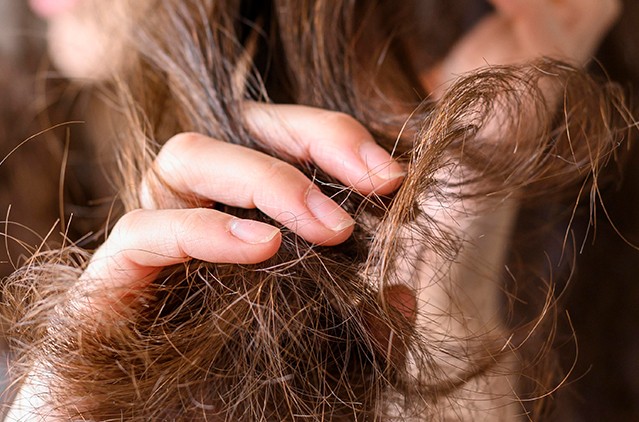
IN THIS ARTICLE:
Introduction
Causes of Dry Hair
Complications from Dry Hair
Treatments for Dry Hair
Professional Hair Treatments
Preventing Dry Hair in the Long Run
Conclusion
FAQs on Dry Hair
Introduction
You may develop brittle hair due to environmental conditions such as dryness or heat, your styling method, and some medical conditions, including thyroid issues.
Dry hair grows when your hair doesn’t get enough moisture. This minimizes its sheen and can make it appear frizzy and dull.
Dry hair can affect men and women of any age, but you’re more likely to develop it as you get older.
Your hair consists of 3 layers. If your hair is in good health, natural oils in the outer layer help protect the inner layers. They also reflect light, making your hair appear shiny. Sheen and luster are two crucial signs of healthy hair, and when these are missing, considering a professional hair treatment for dry hair becomes essential.
Causes of Dry Hair
Various factors can lead to dry hair, including environmental conditions, hair care habits, and your physical health.
The following are a few environmental factors that may contribute to dry hair:
- Living in a dry, hot climate
- Spending a lot of time in the sun or wind
- Frequently swimming in chlorinated or salty water
The following hair care routines frequently cause dry hair:
- Washing your hair too often
- Using harsh shampoos and conditioners
- Dying or chemically treating your hair
- Regularly blow-drying your hair
- Using electric curling irons, straighteners, or curlers
In some cases, dry hair is the result of an underlying health problem that affects your hair’s ability to retain moisture. Examples include:
- Anorexia nervosa: An eating disorder, anorexia nervosa can lead to malnutrition. It can cause dry and brittle hair, along with more serious complications.
- Hypoparathyroidism: If you have hypoparathyroidism, the parathyroid gland in your neck synthesizes too little parathyroid hormone, which decreases the level of calcium in your blood. Calcium is an essential nutrient for healthy hair, as well as bones, teeth, and other tissues.
- Hypothyroidism: With hypothyroidism, your thyroid glands don’t release enough level of thyroid hormones. Dry and brittle hair is one of the early signs of this problem.
- Menkes syndrome: Is a rare genetic disorder, your cells don’t absorb enough copper. A low level of copper absorption affects the health of your hair, causing dryness.
Complications from Dry Hair
Although dry hair and damaged hair are not the same, dry hair can turn into damaged hair if you don’t treat it. When hair gets brittle and isn’t cared for properly, it may break and cause hair loss. So, it’s important to keep an eye on your hair’s condition and use the right treatments and preventive steps to keep it from drying out.
Treatments for Dry Hair
In many cases, you can opt for a hair treatment for dry hair along with simple lifestyle changes. Here are a few you can try:
- Avoid shampooing your hair every day.
- Condition your hair every time you wash it.
- Use a shampoo and conditioner that are meant for your hair type.
- Use moisturizing styling products.
- Avoid chemical hair treatments.
- Blow-dry your hair less frequently.
- Avoid flat irons, curling irons, and electric rollers.
Shampooing your hair every day can cause dryness and deprive it of its protective oils. Instead, try washing your hair once or twice a week. To add shine and softness, you can also use leave-in conditioners or hair oils.
Professional Hair Treatments
At-home hair treatments may not be enough to address moderate to severe dryness. In such cases, advanced hair treatment for dry hair options are available at clinics like Kosmoderma.
1. Hydrafacial Keravive for the Scalp
A high-quality scalp treatment that restores a healthy environment for softer, stronger hair by deeply cleansing, exfoliating, and hydrating the scalp.
2. Platelet-Rich Plasma (PRP) Treatment
PRP Treatment improves hydration and scalp health by using your own growth factors, which also indirectly improves the thickness and texture of your hair.
3. Hair Mesotherapy
A minimally invasive procedure that targets the underlying cause of dryness by directly delivering hyaluronic acid, vitamins, and peptides to the scalp.
Preventing Dry Hair in the Long Run
Sustainable habits are more important for managing dry hair than temporary solutions. Here’s how to regularly nourish your strands:
- Consume a well-balanced diet high in proteins, zinc, biotin, and omega-3 fatty acids.
- Drink two to three liters of water every day to stay hydrated.
- Protect your hair from the damaging effects of the sun and pollution.
- To avoid split ends, get regular trims every 6–8 weeks.
- Steer clear of excessive processing using chemical straightening or dyes.
- Regular care keeps your hair hydrated, strong, and naturally lustrous, so consistency is essential.
Conclusion
You don’t have to live with dry, brittle hair. The right treatment for dry hair, whether at home or in a clinic, can restore softness, shine, and strength. Understanding the causes helps you tackle the problem at its source.
Our team at Kosmoderma Skin, Hair, and Body Clinics designs personalized solutions for each client. With our specialized scalp treatments and practical advice, we help you achieve healthier hair that feels great and looks even better.
The next time you wish your hair were softer as you run your fingers through it, remember that the solution is closer than you think. It just takes the right care, professional guidance, and a bit of consistency.
FAQs on Dry Hair
1. Is dry hair the same as damaged hair?
Not always. Dry hair lacks moisture, while damaged hair has structural harm, often from chemicals or heat. However, untreated dryness can eventually cause damage.
2. Can diet really affect hair dryness?
Yes. Deficiencies in protein, iron, zinc, or vitamins like B12 can directly impact hair texture and moisture.
3. How often should I oil my hair if it’s dry?
Oiling once or twice a week can help restore moisture. Choose lightweight oils such as argan or coconut oil to avoid build-up.
4. Are salon treatments enough to cure dry hair?
They provide intensive hydration, but results last longer when combined with proper home care and a balanced diet.
5. When should I see a doctor for dry hair?
If dryness persists despite good care, or if you also notice sudden hair loss, scalp issues, or other health symptoms, it’s best to consult a dermatologist.
 Whatsapp: 7676757575
Whatsapp: 7676757575 


